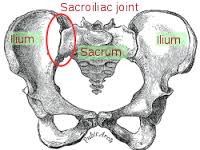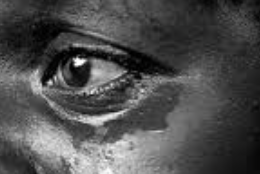heresick
When patients come to the clinic, they have to give the medical assistants a reason for their visit. One of the most common complaints they give is, "Tout les corps fait mal," which means, "The whole body feels ill," or, "Whole body pain." I see at least a dozen patients a day who say that. "Tout les corps fait mal."
Often it's people who are 50 and older who have spent their life doing manual labor. The women carry buckets of water or bundles of firewood on their head. They go through sometimes as many as eight, nine, ten pregnancies in their lifetime. Then they carry their babies on their backs until the children are about two years old.
The men hoe large fields with a small, hand-held tool that requires them to be stooped over all day. They chop firewood, mix cement, and carry heavy loads of building materials.
The Togolese people who aren't lucky enough to have a bicycle or a motorcycle have walked for hours upon hours. And at night, they sleep on the ground without a mattress or a pillow. They get malaria over and over and over again.
It's no wonder their bodies hurt.
There's not usually anything I can do for them, except to give them Tylenol and Ibuprofen and tell them to rest whenever they can.
On Friday I was in clinic when a woman came in with that complaint: "Tout les corps fait mal."
When she walked in the room, I learned that she wasn't actually talking about whole body pain; she had really bad back and hip pain, and she was so stiff, she shuffled when she walked, and her upper body was tipped forward about 20 degrees.
She was only 35, but she walked with the gait and posture of an 80-year-old woman.
She told me her back had gotten progressively stiff over the past two years, and now her pain was debilitating.
I examined her, and isolated the problem. Her sacroiliac (SI joint), the place where your back meets your hips, was nearly frozen.

I had a lot of other patients waiting. The quick solution would've been to write her for pain meds and send her out, but that wouldn't solve the problem, and this woman would be suffering for many years. Or, I could take an extra fifteen minutes with her to explain the problem and show her some stretching exercises that would help more than meds.
I decided to take an extra fifteen minutes with her so she could (hopefully) spend the next few decades of her life without this pain.
I had my translator explain the problem, and then I told her I could show her exercises to do. I warned her that the exercises would be painful at first, but they would help.
"Is that okay?" I asked her.
She nodded eagerly.
First, I had her lay on her back, and hug her knees to her chest. As she drew her knees in, she felt sharp pain, and sucked her breath in quickly. Then she started to hyperventilate.
"No, like this," I said, as I pointed to my face and took a deep, slow breath in through my nose and then gently, slowly blew it out through my mouth. "Breathe like this until the pain goes away."

And God bless her, she did. She laid there breathing slowly and calmly, letting the pain and stiffness leave her back. Finally, her face relaxed. The pain had passed.
Next I had her rock her knees side to side, then hold her knees to her chest one at a time. The last exercise was to lay on her stomach with her hands palms-down next to her shoulders. I showed her how to straighten her elbows until her upper torso was off the floor (in yoga, it's called the Dolphin Pose.) As she held the pose, tears sprang to her eyes as her back extended farther and her hips stretched more than they had in two years.
"Keep breathing," I said. "Keep breathing, and the pain will pass."
She kept breathing, until a few minutes later, her face relaxed into a smile. "It's better! It's better! It's better!" she said and looked at me with surprise, as if I'd just worked a miracle.
But all the credit went to her, because she had endured longer than the stiffness, longer than the pain, and that's what healed her.
That night I was thinking about the tears in the woman's eyes as she was learning to take deep, slow breathes -- and the joy on her face at the end of the visit.
I thought about the times in my life where I felt like that woman, wanting suffering to end quickly, wanting God to magically make it go away. And then God doesn't make it go away. Instead, he gently whispers, "Stay."
I've made up a word for how I feel when God asks me to stay in painful places. I call it Heresick.
I'm not homesick, suffering because I'm absent from home. I'm heresick, suffering because I'm present in a difficult situation.
As children, we often outgrow homesickness. But as adults, we often encounter heresickness, trapped in rocky marriages or stressful jobs or financial crises or family conflicts or boring towns or difficult classes or emotional pain.
Heresick people are the ones who pray, "God anywhere but here." "Anything but this." Or, "If you just get me out of here, I'll...."
The quick solutions to heresickness are to either numb out or get out.
The hard alternative is to stay. (***A quick but important caveat: I'm not talking about staying in violent/abusive relationships or physically unsafe places. If you're in that kind of situation, please reach out for help, and do whatever it takes to get out.)
Many times in our lives, we are faced with this choice. We can leave, we can use our drug of choice to numb out, or we can stay.
The problem is, if we shortcut the pain, it stays with us.
If we endure the pain, if we stay, if we calmly breathe in and breathe out while we let the waves of discomfort wash over us, the pain is transformed.
We are transformed.
Because pain drives us deeper.
When we stop resisting pain and submit to it, we sink into it. At first, it feels like drowning. And then we realize that we're not sinking deeper into death; we are sinking into a deeper life. Into a deeper way of being, a deeper way of knowing, a deeper stillness, a deeper trust in our Abba Father.
If you're feeling heresick today, my heart goes out to you. I'm so sorry for the pain you're experiencing.

But my prayer for you is not that God would provide an instant ejection button to get you out of the situation you're in.
My prayer is that you would breathe, that you would trust, that you would stay. That you would let God transform your numbness into knowing, your running into rest, your desperation into deepness.